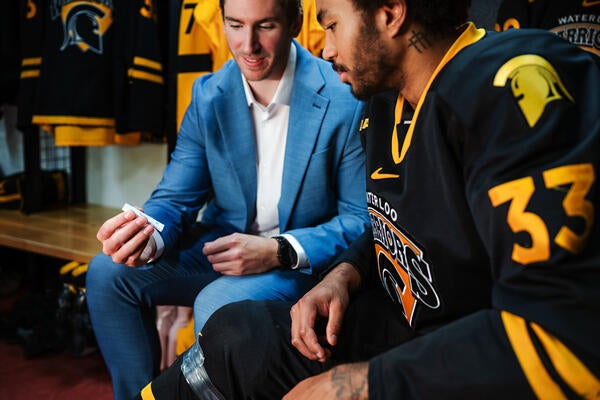
A big shot in the armband
Startup founded by Waterloo engineering alumni secures $14.5 million in funding for growth and development of gesture-control armband.

Startup founded by Waterloo engineering alumni secures $14.5 million in funding for growth and development of gesture-control armband.
By Staff Student Success OfficeJust one year after graduating from the University of Waterloo’s Faculty of Engineering, three young entrepreneurs have secured $14.5 million in funding for their company, Thalmic Labs. The startup has already pre-sold 30,000 armbands that control computers and smartphones with gestures.

“The funding will be used to fuel continued growth, further product development of MYO, and develop future products and technologies,” said Stephen Lake, CEO and co-founder of Thalmic Labs. “This new investment will help us realize our vision of a new era of computing, where the lines between humans and digital technology become increasingly blurred.”
Lake and fellow alumni, Aaron Grant and Matthew Bailey, created the MYO armband by combining their knowledge of biomedical research, engineering and machine learning. This most recent funding came from a financing round led by Spark Capital and Intel Capital.
The MYO takes the wearer’s movements and the electrical activity of the muscles and turns it into useful information. That means while wearing the armband you can remotely control an object, interact with a PowerPoint presentation and play video games all without a remote.
"We are at the beginning of a revolution in how we interface with computers, and the team at Thalmic Labs has made some truly disruptive breakthroughs,” said Nabeel Hyatt of Spark Capital.
VeloCity grads
With a staff of 20, the team is working hard to ensure a smooth production of the MYO armbands due to their purchasers by the end of the year. This growing team is soon relocating from the VeloCity Garage to another space in Kitchener.
“VeloCity has been a huge supporter of us, as has the broader Waterloo startup community/ecosystem,” says Lake. “It was a great opportunity to continue building the community and expand the focus on ‘hard tech’ entrepreneurship, which we feel strongly about.”
The company recently took part in the Y Combinator program in Mountainview, CA. While he missed the shared workspace of the VeloCity Garage, Lake notes that at Y Combinator there was a different kind of excitement because of the access to so many large, successful tech companies in the Silicon Valley.
“We’re actively recruiting for over 30 people, from software engineers to supply chain and manufacturing expertise” said Lake. “The jobs are all in Kitchener-Waterloo. Why go anywhere else? The region is seeing incredible growth and exciting stuff is happening right here.”

Read more
Upside Robotics secures new funding to accelerate the future of sustainable farming

Read more
Redefining capstone learning by bringing students, faculty and community partners together to tackle real-world challenges

Read more
New medical device removes the guesswork from concussion screening in contact sports using only saliva
The University of Waterloo acknowledges that much of our work takes place on the traditional territory of the Neutral, Anishinaabeg, and Haudenosaunee peoples. Our main campus is situated on the Haldimand Tract, the land granted to the Six Nations that includes six miles on each side of the Grand River. Our active work toward reconciliation takes place across our campuses through research, learning, teaching, and community building, and is co-ordinated within the Office of Indigenous Relations.